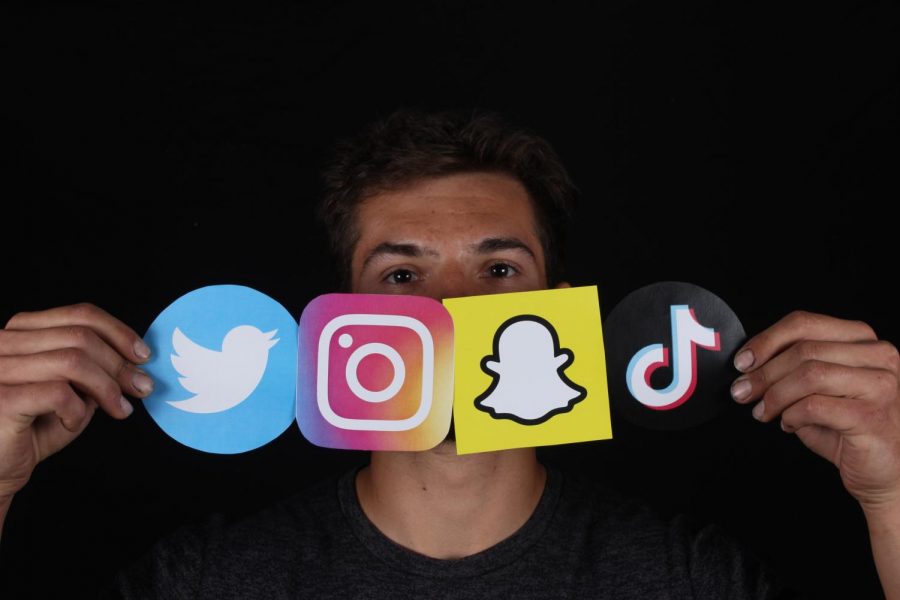Viewer Discretion Advised
Blocking misinformation on social media brings about various opinions
Senior Alin Cercea holds up social media icons, which are at the center of a debate.
April 21, 2021
After Twitter permanently suspended former President Donald Trump before President Joseph Biden’s inauguration, the idea of censorship on social media platforms has reached heated debate. Essentially, Trump had spread false information that Twitter stated was “risk of further incitement of violence” after the attack against the Capitol on Jan. 6. The country has since moved on, but the ability to censor online has created a grey area for some.
AP Government and Politics teacher Clinton Longwell says there is a difference between what the government can censor versus what a business can censor.
“The government’s censorship is limited,” Longwell said. “They can’t restrict a lot of speech. The Supreme Court has been pretty firm on that. Hate speech is constitutionally OK … that goes along with having a free society where you can voice your opinions, however morally correct they may be. … Whereas in corporate censorship; they have a lot more freedom to restrict your speech when you use their platforms. I think that’s something they have a right to do and it’s perfectly OK.”
Government teacher Alexander Edwards expands on Longwell’s statement.
“Freedom of speech is an agreement between you and the government and not you and a private company,” Edwards said. “Private companies have the right to restrict your speech because you’re beholden to their terms of service.”
Students often feel empowered by others’ words or words they are able to share themselves, regardless of the platform. Freedom of speech, however, is not meant to be related to social media. Social media creates a space of enjoyment — sometimes.
“I think it’s a good platform for people to network and it’s a good community place,” senior Kennadi Russell said. “It’s an outlet for people to post what they’re interested in or what they’re passionate about.”
Russell said she has mixed feelings about social network apps.
“It can be a very toxic place,” she said. “I think it’s easy for people to compare themselves to others on social media and a lot of times you only see the highlights of people’s lives on social media. But you have the power to remove and unfollow certain people.”
As a teacher and an adult, Edwards had his own quarrels with social media. He hasn’t owned any social media accounts.
“I don’t like anything about it,” Edwards said. “That’s it. I think social media is a propaganda tool that has been used to weaponize information in a way that is detrimental to society. I also think social media in general has created a barrier between lunatics and society. I think before, when you wanted to be the town idiot, you had to walk outside of your house and say really dumb things. Now you just go on social media and say all the dumb things you think and it gives you this false barrier of anonymity.”
With the ability to say seemingly anything, problems and arguments can occur. Russell is strong in her belief that everyone should be free to say as they please under the First Amendment, but agrees that social media companies are in charge of regulating posts on their websites.
“When it comes to that whole situation — when you are encouraging harm, that sort of thing needs to be shut down and blocked,” Russell said. “Especially with the spread of misinformation.”
Senior Austin Harkins differs a bit in how he feels about limiting speech on social media.
“I think censorship is really bad because it gets into the problem of whoever has the power,” Harkins said. “Social media companies have the power to influence what you see — that’s how the algorithm works. If they can censor people’s voices and political opinions, but not all political opinions, then you get into the problem of you only seeing one side because that’s what they want you to see.”
Censorship of “fake news” or sensitive topics is often welcomed by viewers.
“There’s always going to be incorrect information spreading throughout media — I mean every single day,” Russell said. “When it’s coming from a political figure — a very high political figure – that’s when you have issues.”
Some believe that even censoring false information could lead a dangerous path.
“If you start censoring false information, you are the controller of facts,” Harkins said. “You can say your false information is facts just from that type of perception. As a person, I don’t know what’s true and false — I just go off of what the news tells me.”
There are ways to avoid spreading misinformation by viewers.
“Definitely do further research and know what you’re reposting and know what you’re talking about before you spread that information further,” Russell said.
Stopping the spread of incorrect information can start with the platform as well.
“I think there should be some kind of reconciliation on the social media website so they can report the content as inaccurate,” Edwards said. “I also think social media companies have to have some sort of fact checking system in place to make sure information is accurate.”
It can be argued that the government could step in to make laws on social media censorship. However, this is seen as a risky move for many reasons.
“I do not think the government should interfere with how social media companies censor content because if the government is a majority left wing or majority right wing government, then it will be bad because it’s politically motivated,” Russell said.
Regulation of censorship within private companies is not quite government territory.
“I think that at some point you have to put some responsibility on the citizens to police themselves in some way,” Longwell said. “Unfortunately, there’s people that are not going to do that but at the same time, if you are solely relying on information from social media, and you’re not using all the different sources that are available to you today, then there’s some personal responsibility that goes along with that.”
As a teacher, Longwell has watched his students take in information and advised them to be careful about what they’re reading.
“I think it’s important for young people to make sure that they don’t rely solely on what they read on the internet — on social media in particular,” Longwell said. “Your mainstream news media sources — New York Times, Washington Post, ABC, NBC, CBS, Nightly News, USA Today — those type of resources are, when they’re reporting on the actual news, as close to unbiased as they actually can be. There’s going to be inherent bias no matter where it is, but if you’re reading those sources you’re going to get as much correct information as possible.”






